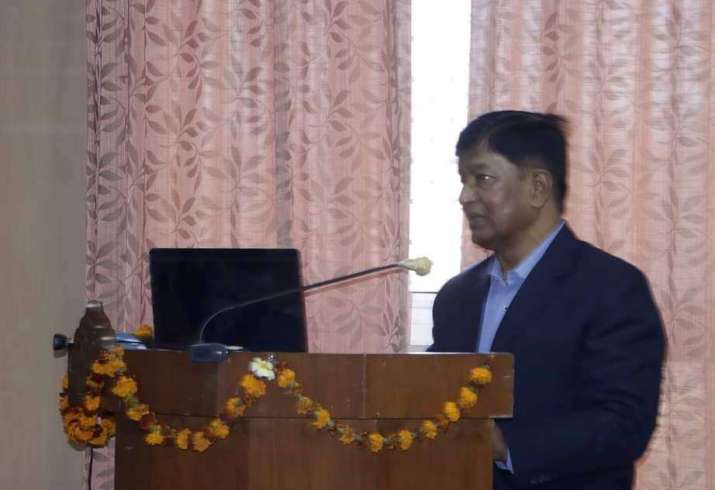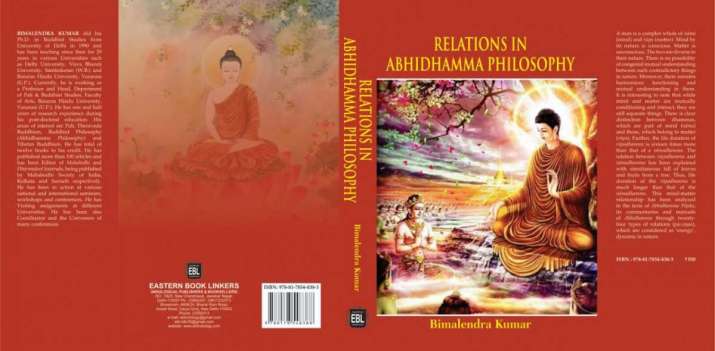NEWS
Indian Buddhist Scholar Publishes Book on Relations in Abhidhamma Philosophy
 Prof. Bimalendra Kumar
Prof. Bimalendra KumarIndian Buddhist scholar Prof. Bimalendra Kumar has released a revised and updated edition of his book titled Relations in Abhidhamma Philosophy. The author describes the book as based on the topic of dependent co-arising, and containing seven chapters of vivid discussion about the theory of relations.
The book was launched on 17 February at the 15th Nalanda Dialogue, which was held on the theme of Yoga, Science and Technology, in the presence of distinguished scholars, scientists, and yogic practitioners, including Prof. Rajendra Prasad, vice-chancellor of Magadh University, Gaya; Dr. Bal Mukund Pandey, secretary-general of Akhil Bhartiya Itihas Sankalana Yojana; and Prof. Abha Singh, pro-vice chancellor of B. N. Mandal University, Madhepura, Bihar. The event was organized by the Department of Philosophy of Nava Nalanda Mahavihara in Bihar.
“My dissertation for my master’s in philosophy was published as Theory of Relations in Buddhist Philosophy by Eastern Book Publishers, Delhi, in 1988. The book was reviewed by Prof. G. C. Pandey and published in the Indian Historical Quarterly, Volume XVII, Number 1–2, Indian Council of Historical Research, New Delhi,” Prof. Kumar said of the original publication.
About the new revised edition, published by Eastern Book Linkers, Delhi, Prof. Kumar observed: “During my academic pursuit, I presented some of my papers related to the theory of relations at seminars and conferences and received feedback from scholars from time to time, enabling new thoughts for my thesis.”
Chapter one of Relations in Abhidhamma Philosophy examines the mutual relations of mind and matter. Chapter two discusses the analytical exposition of the 24 types of relations, with definitions and examples, as expounded in the Patthanappakarana and its commentary. Chapters three and four explain the relations of mind and matter with regard to how five-door process consciousness and mind-door process consciousness cognize their respective objects with the help of the theory of relations.
Chapter five explains dependent co-arising through the theory of relations. Chapter six contains the theory of relations as understood in the Theravada and Sarvastivada Abhidharma traditions. Chapter seven incorporates the importance of human relations, such as psychological life, ethical life, religious life, social behavior, and some other philosophical ideals, i.e., the Four Noble Truths, the Noble Eightfold Path, the theory of dependent co-arising, the theory of action, and the theory of rebirth.
 Photo by Prof. Bimalendra Kumar
Photo by Prof. Bimalendra Kumar“Bimalendra Kumar’s study . . . offers us a clear and detailed account of the concept of paccaya, causal conditions. The law of dependent origination is clearly expounded,” noted Charles Willemen, rector of the International Buddhist College, Thailand, in his foreword. The importance of this study reaches beyond the Indian cultural sphere. Scholars of Chinese Buddhism will benefit from this study too, even though Abhidharma there is rather traditional Sarvastivada.
“Through my quick reading into this work made me amazed to identify how brilliantly Prof. Bimalendra Kumar articulates the Theravada theory of relations between mind and matter in an easy-to-understand language, clarifying and interpreting the meanings of almost all the Abhidhamma terms that require for understanding the subtle nuances of this profound subject,” commented G. A. Somaratne, associate professor at the Centre of Buddhist Studies at the University of Hong Kong in his foreword. “As I see, the work is truly an excellent piece produced on the Theravada Abhidhamma in recent history.”
Prof. Kumar has updated the title of the book to Relations in Abhidhamma Philosophy, as per the suggestion of Prof. G. C. Pandey in his review. The volume begins with a dedication to the late Prof. Ram Shankar Tripathy, former head of the Department of Bauddha Darsana, and former dean of the Faculty of Sramana vidya, Sampurnanand Sanskrit University in Varanasi. The book thoughtfully includes a list of abbreviations before the main content to help out the reader and ends with a bibliography and Index.
Related news from Buddhistdoor Global
The Buddhist on Death Row: Book on Jarvis Jay Masters Released
Korean Nun Publishes New Book on Buddhist Cuisine to Heal Mind and Body
Tina Turner Releases Book on Happiness, Offers Solace for All Those Suffering in the Pandemic
Indian Scholars Publish Romanized Edition of Sangitiyavamso: The Chronicle of Buddhist Councils on Dhamma & Vinaya
Related features from Buddhistdoor Global
Discovering Radical Happiness
Book Review – China Root: Taoism, Chan, and Original Zen
Book Review: Thriving in Crisis: Buddhism and Political Disruption in China, 1522–1620
The Faces of Kshitigarbha: A Book of Art about Hell’s Bodhisattva














